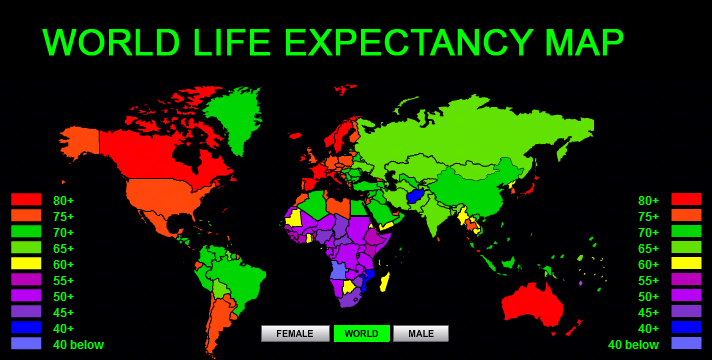
Study sees U.S. life expectancy falling further behind other countries
Last Updated Feb 22, 2017
Life expectancy in the United States is already much lower than most other high-income countries and is expected to fall even further behind by 2030, new research published today predicts.
According to the most recent government figures, life expectancy at birth in the United States is 76.3 years for men and 81.2 years for women.
Using a number of forecasting models, researchers from the U.K. predict life expectancy in the U.S. will improve to 83.3 years for women and 79.5 years for men by the year 2030.
But despite these modest gains, the United States is still lagging behind other developed countries.
“The USA has the highest child and maternal mortality, homicide rate, and body-mass index of any high-income country, and was the first of high-income countries to experience a halt or possibly reversal of increase in height in adulthood, which is associated with higher longevity,” the authors write.
The United States also lacks universal health coverage available in other high-income countries and has the largest share of unmet health care needs due to financial costs.
The study, published in The Lancet, predicts and ranks life expectancy for 35 developed countries across Asia, North and Latin America, Australia, and Europe.
The findings predict life expectancy is likely to be highest for women in South Korea at 90.8 years, France at 88.6 years, and Japan at 88.4 years. For men, life expectancies will be highest in South Korea at 84.1 years, and Australia and Switzerland, both at 84 years.
The researchers say other nations, particularly the United States, could take lessons from these countries when it comes to improving life expectancies.
“For example, South Korea projected gains may be the result of continued improvements in economic status which has improved nutrition for children, access to health care and medical technology across the whole population,” study author James Bennett, PhD, of Imperial College London, told CBS News. “South Korea has lower disease risk factors — for example, they appear better at dealing with high blood pressure and have low rates of obesity. A very equitable society means that the whole population has benefitted from improvements.”
Unlike other studies, which typically rely on a single model to predict life expectancy, the researchers used a statistical technique used in weather forecasting to develop 21 models to predict life expectancy in the countries studied.
Studying life expectancy is important, the authors say, because increasing life expectancies will have major implications for health and social services and countries will need to adapt and create new policies to support healthy aging. This may include increase investment in health and social care and possibly changes to retirement age.
“As recently as the turn of the century, many researchers believed that life expectancy would never surpass 90 years,” lead author Prof. Majid Ezzati, of Imperial College London, said in a statement. “Our predictions of increasing lifespans highlight our public health and health care successes. However, it is important that policies to support the growing older population are in place. In particular, we will need to both strengthen our health and social care systems and to establish alternative models of care such as technology-assisted home care.”
In addition to calculating life expectancy at birth, the study authors projected how long people aged 65 years in each country were likely to live in 2030. They found that in 11 of the 35 countries studied, 65-year-old women were likely to live an additional 24 years, while 65-year-old men were likely to live an additional 20 years in 22 of the countries. This suggests that older populations are likely to continue to grow across developed countries.
The authors note that the study cannot take into account certain changes within countries that could impact life expectancy, including the possibility of major political upheaval that can affect social and health care systems.
Dr. Ailiana Santosa, of the Center for Demographic and Aging Research at Umeå University in Sweden, says that a crucial point the study is missing is whether or not a longer life also translates to better health.
“People will live longer in the future, but do they live longer and healthier? I think this point is really important to explore further,” she told CBS News. “Our population is aging, but are they healthier?”
In an accompanying editorial, Santosa emphasizes that universal health coverage is key to maintaining populations that continue to live longer.
“Forecasting life expectancy at birth and at age 65 years can help governments and health services to make the right investments in health, such as averting deaths due to infectious diseases and reducing maternal and child mortality,” she writes. “Achieving universal health coverage is worthy, plausible, and needs to be continued.”
Citizens can also do their part by living a healthy lifestyle, including a healthy diet, exercise, and avoidance of smoking.
“For individuals, extra years of life expectancy does not necessarily mean extra years of healthy life,” Bennett said. “Individuals need to take care to remain healthy so as to remain disease free into older ages.”
© 2017 CBS Interactive Inc. All Rights Reserved.
No comments:
Post a Comment